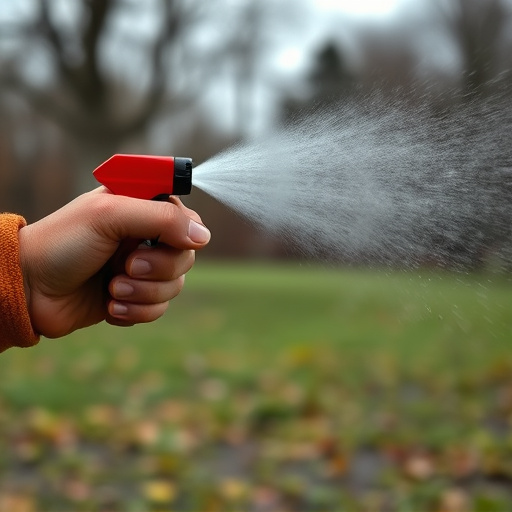Pets, especially dogs and cats, are susceptible to respiratory distress, coughing, and panic attacks after exposure to pepper spray due to their sensitive respiratory systems. Immediate actions include rinsing affected areas with warm water, seeking veterinary care for monitoring, maintaining a calm environment, and keeping emergency contacts handy. For eye irritation, flush eyes with lukewarm water for 15 minutes. Home remedies like honey or aloe vera gel can aid recovery after initial flushing. Veterinary care is vital for severe cases; follow vet instructions regarding medications and restrictions for effective treatment. Prevent future incidents through secure storage, education, and regular training on first aid for pepper spray exposure in pets.
“Aerosol spray, a powerful defense against attackers, can pose significant risks for pets if exposed. This comprehensive guide delves into the intricacies of treating pets exposed to pepper spray, offering immediate steps for irritation relief and home remedies for post-exposure comfort. For severe cases, veterinary care and medications are explored. Additionally, learn about safe storage practices and training to prevent future incidents and ensure your pet’s well-being.”
- Understanding Pepper Spray Exposure Risks for Pets
- Immediate Steps to Treat Pepper Spray Irritation
- Home Remedies for Pet Comfort After Exposure
- Veterinary Care and Medications for Severe Cases
- Preventing Future Incidents: Safe Storage & Training
Understanding Pepper Spray Exposure Risks for Pets
Pets, especially dogs and cats, can be inadvertently exposed to aerosol spray during self-defense or law enforcement operations. Pepper spray, designed to incapacitate attackers, poses unique risks for animals. Unlike humans, pets have more delicate respiratory systems, making them susceptible to longer-lasting effects. Inhaling pepper spray can lead to coughing, difficulty breathing, and even panic attacks in dogs and cats.
Treating pets exposed to pepper spray requires immediate action. Rinse the affected area with warm water to flush out any residual spray. Seek veterinary assistance promptly, as professionals can administer necessary treatments, monitor vital signs, and provide supportive care tailored to the pet’s needs. Ensure a calm environment to prevent further stress and always keep emergency contact details handy for quick response during such incidents.
Immediate Steps to Treat Pepper Spray Irritation
If your pet has been exposed to aerosol pepper spray, immediate action is crucial. The first step is to remove any remaining spray from their fur or skin by gently washing them with warm water and a mild soap. This will help dilute the irritant and prevent further absorption. After washing, rinse thoroughly to ensure no residue remains.
For pets with eye irritation, such as tearing, redness, or discomfort, provide a clean, calm environment and flush the eyes gently with lukewarm water for at least 15 minutes. Keep your pet comfortable and monitor their breathing, as pepper spray can cause coughing or difficulty breathing. If symptoms persist or worsen, seek veterinary attention immediately to ensure proper Treating Pets Exposed to Pepper Spray and prevent any long-term health issues.
Home Remedies for Pet Comfort After Exposure
After exposure to aerosol spray, especially pepper spray, pet comfort and care become a priority. While professional veterinary treatment is always recommended for severe cases, there are several home remedies that can help alleviate discomfort and speed up recovery. One initial step is to rinse the affected area with warm water to dilute any remaining spray residue. This gentle wash helps prevent further irritation.
For mild symptoms like tearing eyes or skin irritation, applying a cool compress can provide relief. Additionally, creating a calm environment free from loud noises or intense lights aids in soothing stressed pets. Some natural remedies, such as honey or aloe vera gel, have anti-inflammatory properties and can be topically applied (after diluting if necessary) to soothe irritated skin. Remember, treating Pets Exposed to Pepper Spray requires patience and love, with professional help readily available for more severe cases.
Veterinary Care and Medications for Severe Cases
In severe cases where pets have been exposed to aerosol spray, particularly pepper spray, immediate veterinary care is crucial. The first step is to flush the affected area thoroughly with water to dilute and remove any residual chemicals. This should be done gently yet promptly, especially around the eyes, nose, and mouth, as these are sensitive areas.
Medications such as antihistamines and corticosteroids may be prescribed by a veterinarian to alleviate symptoms like itching, swelling, and respiratory distress. Eye washes or irritant-neutralizing solutions might also be recommended for eye exposure. It’s important to follow the vet’s instructions precisely, including any restrictions on physical activity and specific medications to ensure treating pets exposed to pepper spray effectively.
Preventing Future Incidents: Safe Storage & Training
Preventing future incidents starts with implementing proper safe storage measures for aerosol spray defenses. Keeping these devices out of reach and securely stored, especially in areas accessible to children or unauthorized individuals, is paramount. Additionally, regular training sessions can ensure users understand the correct handling procedures, de-escalation techniques, and immediate first aid steps, such as treating pets exposed to pepper spray. Educating everyone on the premises about the presence and use of these devices can also deter potential attackers, making them less likely to target a location with robust security measures in place.
While aerosol spray can be an effective defense against attackers, it’s crucial to understand the risks it poses to pets and take proactive steps for prevention and treatment. By being prepared with knowledge and resources, pet owners can ensure their furry companions remain safe during potential incidents. Through immediate care, home remedies, veterinary assistance when needed, and proper storage alongside training, we can minimize the impact of pepper spray exposure on our pets and promote a secure environment for all.
